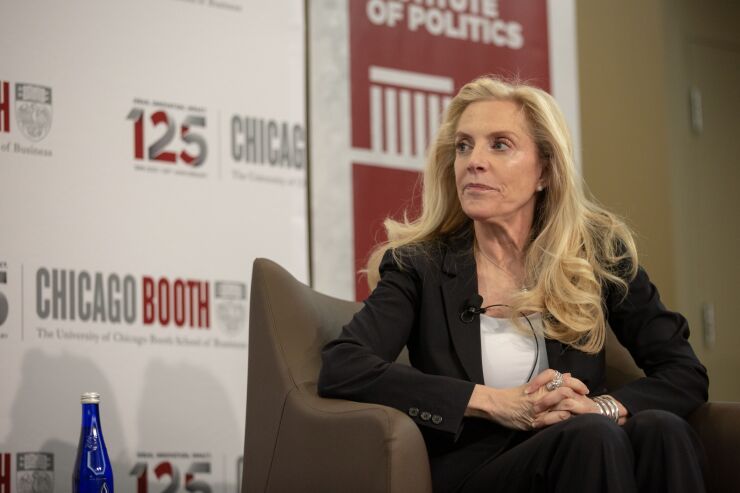Federal Reserve Vice Chair Lael Brainard will leave the Board of Governors next week to become the next director of the National Economic Council.
After weeks of rumor and speculation that Brainard would become President Biden's top economic advisor, the move became official Tuesday afternoon. The White House issued a statement announcing several newly appointed economic advisors.
In the release, Biden praised Brainard's past work on the Council of Economic Advisers, the National Economic Council and the Treasury Department, as well as her nine-year tenure at the Fed.

"Lael, one of the country's leading macroeconomists, brings an extraordinary depth of domestic and international economic expertise, having previously served at CEA, NEC, the Treasury Department and the Federal Reserve," he said. "She is a trusted veteran across our economic institutions, and understands how the economy affects everyday people."
Brainard submitted her resignation shortly after the announcement was made. Her final day with the Fed will be on or around Feb. 20.
It also raises a host of questions about whom will be picked to replace her — and when — as well as how the board will be reorganized and what the shake-up will mean for the various initiatives in her portfolio, including this summer's rollout of a real-time payments platform and the ongoing effort to reform the Community Reinvestment Act.
Brainard has been a leading voice on regulatory and supervisory issues on the board. During the Trump administration, she
More recently, Brainard has established herself as one of the more dovish members of the board in the Fed's recent campaign to rein in inflation through tighter monetary policy. She has not voted against any of the Federal Open Market Committee's rate hikes, but she has raised concerns about
Brainard, who holds a Ph.D. in economics from Harvard University, had a distinct role as one of the board's leading economists — Chair Jerome Powell, by contrast, has a background as a lawyer and investment banker. Fed watchers say the Biden administration will be keen to make sure whoever replaces Brainard as the Fed's second-in-command is similarly trained to be a counterbalance to Powell, who was originally elevated to the Fed's top post by President Donald Trump.
"From the White House's perspective, they want someone who's a Ph.D. economist and they want someone who's a Democrat — these are two things that Powell is not," said Derek Tang, co-founder of the Washington-based research firm Monetary Policy Analytics. "That person will play an important role in driving when the Fed pivots [on monetary policy] later this year, for example."
Brainard has also become a singular force on the Fed's internal committees, chairing four of the eight groups, including economics and monetary affairs; payments, clearing and settlements; financial stability and board affairs.
"Lael has brought formidable talent and superb results to everything she has done at the Federal Reserve," Powell said in a written statement Tuesday afternoon. "That lengthy list includes her thought leadership on monetary policy and economic research, her stewardship of financial stability and the payments system, strengthening the financial system both domestically and globally, and helping to manage the immense operational agency challenges during the pandemic. My colleagues and I will truly miss her."
Brainard's departure will leave the board one member short of its full seven-member head count until a new governor and vice chair are nominated by the president and confirmed by the Senate. The governing body only recently
Biden could tap an existing Fed governor to serve as the board's second-in-command, but Fed watchers expect the administration to go with an outside candidate because of the lack of experience among Democrat-appointed governors — Governors Philip Jefferson and Lisa Cook both joined the board last year, just weeks before Barr.
Katheryn Judge, a Columbia University law professor who specializes in bank regulation, said nominating someone to serve as both governor and vice president could make the position more appealing.
"It could be that you use the vice chair position as a way of attracting somebody of a higher caliber who might not be willing to serve in just a governorship," Judge said. "I think it will be a priority [for the administration], but whether it's a top priority, it's hard to know."






